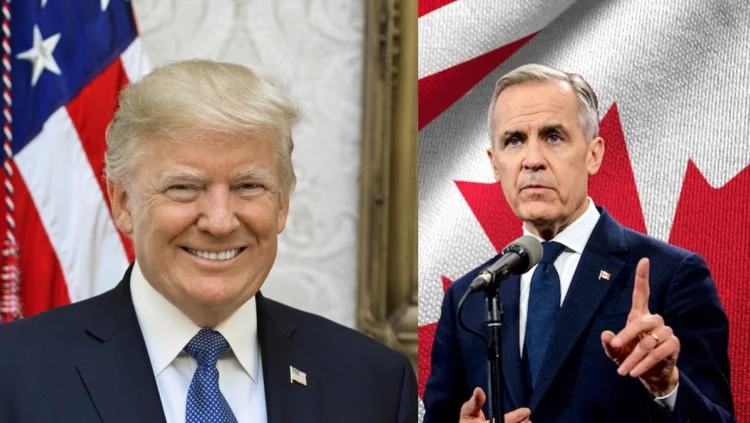A Historic Partnership Fractures Under the Weight of Tariffs and Tensions
In an extraordinary moment that marks a turning point in North American geopolitics, Canadian Prime Minister Mark Carney officially declared that Canada’s longstanding friendship and strategic partnership with the United States is “over.” The announcement, made during a national address from Parliament Hill on March 27, signals the dramatic unraveling of an alliance that weathered the storms of world wars, economic depressions, and acts of terrorism over the last century and a half.
Carney’s message was direct and unequivocal: “The old relationship we had with the United States, based on deepening integration of our economies and tight security and military cooperation, is over.”
Table of Contents
The Catalyst: Trump’s Tariff War and Liberation Day Declaration
Economic Ties Shattered by Trade Aggression
The immediate cause of the rupture is President Donald Trump’s sweeping tariffs on Canadian goods, particularly automobiles, steel, and aluminum. Trump’s “Liberation Day” announcement, in which he justified these measures as a response to Canada’s failure to stop “a minuscule amount” of fentanyl from crossing the border, ignited a chain reaction.
Canada responded by imposing 25 percent counter-tariffs on American auto imports, a retaliatory move that struck at the heart of a once-thriving economic relationship rooted in the 1965 Auto Pact. That historic agreement was instrumental in transforming Ontario into an auto-manufacturing powerhouse and deepening economic interdependence between the two nations.
Political Fallout in Canada: Election Campaigns and Shifting Alliances
Carney and Poilievre Find Rare Common Ground
The fallout from Trump’s tariffs has upended the tone of Canada’s ongoing federal election campaign. Both Carney and his Conservative rival Pierre Poilievre—despite being at odds on most issues—now agree on one fundamental point: Canada must renegotiate its economic and security relationship with the U.S.
Poilievre declared that if elected, he would immediately demand a renegotiation of the CUSMA agreement (known in the U.S. as USMCA), seeking a rapid solution to provide Canadians with economic certainty.
Still, experts are urging caution. A new report titled “Broken Trust: Managing an Unreliable Ally,” authored by prominent former defense and national security officials, warns against rushing into talks with a U.S. administration currently mired in what they describe as political chaos.
Canada’s Global Pivot: Seeking New Alliances Beyond the United States
Building a Coalition of Like-Minded Nations
Faced with the collapse of its closest alliance, Carney announced Canada’s intention to forge a new world order of democratic, like-minded nations—one that would exclude the United States.
“Canada must be looking elsewhere to expand our trade, to build our economy and to protect our sovereignty,” Carney said. “Canada is ready to take a leadership role in building a coalition of like-minded countries who share our values.”
Canada is already taking concrete steps in this direction. Carney’s first international visits as prime minister included France and the United Kingdom, reaffirming ties with Canada’s historic allies. In recent weeks, he has spoken with the leaders of Germany and Mexico, and Canada signed a new Arctic surveillance agreement with Australia to bolster regional defense without U.S. involvement.
Foreign Minister Mélanie Joly Delivers Europe a Stark Message
While Carney was consolidating domestic support, Foreign Affairs Minister Mélanie Joly took the message global. At a NATO foreign ministers’ summit in Brussels, she made it clear that Canada views its relationship with the U.S. as fundamentally changed—if not beyond repair.
“We know that the relationship will never be the same again,” Joly said. “If the U.S. can do this to us, their closest friend, then nobody is safe.”
Joly emphasized Canada’s readiness to apply “maximum pressure” on the United States, with C$60 billion in counter-tariffs already in place.
Cultural Identity Under Threat: Carney Defends Quebec’s Heritage
Trump’s Cultural Attacks Spark a Nationalist Response
On the campaign trail in Montreal, Carney turned his focus to defending Canada’s cultural identity, particularly its French-speaking population in Quebec. He pledged increased funding for the Canadian Broadcasting Corporation and vowed to protect the province’s linguistic and cultural traditions.
“French culture and language are at the center of Canada’s identity, and today that identity is being openly threatened by the president of the United States,” Carney declared. “President Trump wants to assimilate our culture… but we will never let that happen.”
A Sliver of Hope: A Change in Trump’s Tone?
A Tense Relationship, But Dialogue Continues
Despite the dramatic rhetoric, recent developments hint at a possible softening of tone. During a March 28 phone call, Trump referred to Carney respectfully as “Mark” and “the prime minister,” a marked departure from his past insults directed at former Prime Minister Justin Trudeau, whom he dubbed the “governor” of the “51st state.”
Since that call, Trump has ceased his online attacks and public jabs at Canada, suggesting a temporary cooling of hostilities—though few in Ottawa view it as a long-term shift in U.S. policy.
Conclusion: The End of an Era, and the Start of Something New
The declaration that Canada’s friendship with the U.S. is over marks a seismic moment in international relations. What was once the world’s most stable bilateral partnership has been fractured by protectionism, political populism, and a clash of national identities.
Carney’s government is preparing for a new reality—one where Canada no longer relies on the United States as its principal partner. With elections looming and trade talks on the horizon, the coming months will determine whether the rupture becomes permanent, or if there’s still room for reconciliation in a changing world.
